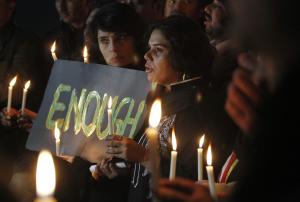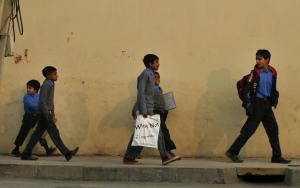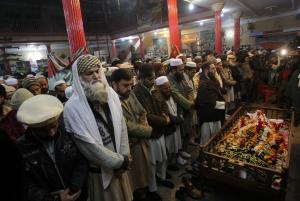PESHAWAR, Pakistan (AP) — Pakistanis mourned as mass funerals got underway Wednesday for 142 people, most of them children, killed the day before in a massacre by the Taliban at a military-run school in the country's troubled northwest.
Prayer vigils were held across the nation and in other schools, students spoke of their shock at the carnage in the city of Peshawar, where seven Taliban gunmen, explosives strapped to their bodies, scaled a back wall using a ladder to get into the Army Public School and College in the morning hours on Tuesday.
Students were gunned down and some of the female teachers were burned alive. The attack was the deadliest slaughter of innocents in the country and horrified a nation already weary of unending terrorist assaults. Army commandos fought the Taliban in a day-long battle until the school was cleared and the attackers dead.
The school was a scene of heart-wrenching devastation as media were allowed in for the first time Wednesday. Blood pooled on the floor and the stairs, amid broken window glass and door frames. Torn notebooks, pieces of clothing and children's shoes were scattered about. A pair of child's eyeglasses lay broken on the ground.
After the attackers entered the school, they made their way into the main auditorium where many students had gathered for an event, military spokesman Maj. Gen. Asim Bajwa told reporters during the tour. The militants then made their way to the hall's stage and started shooting at random.
As students tried to flee for the doors, they were gunned down. The military later recovered about 100 bodies from the auditorium alone, according to the spokesman.
View gallery

Pakistani civil society members take part in a candle light vigil for the victims of a school attack …
"This is not a human act," Bajwa said. "This is a national tragedy."
The government declared a three-day mourning period, starting Wednesday. Overnight, the body of the school principal, Tahira Qazi, was found among the debris from the rampage. Her death raised further the earlier reported death toll of 141.
Qazi, who was inside her office when the militants made their way into the administration building 20 meters (yards) from the auditorium, had ran and locked herself into the bathroom but the attackers threw a grenade inside, through a vent, and killed her. Bajwa said.
Some of the funerals were held overnight, but most of the 132 children and 10 school staff members killed in the attack were to be buried Wednesday. Another 121 students and three staff members were wounded.
"They finished in minutes what I had lived my whole life for, my son," said laborer Akhtar Hussain, tears streaming down his face as he buried his 14-year-old, Fahad. He said he had worked for years in Dubai to earn a livelihood for his children.
View gallery

Pakistani students head to their school in Rawalpindi, Pakistan, Wednesday, Dec. 17, 2014. Pakistan …
"That innocent one is now gone in the grave, and I can't wait to join him, I can't live anymore," he wailed, banging his fists against his head.
The Taliban said the attack was revenge for a military offensive against their safe havens in the northwest, along the border with Afghanistan, which began in June. Analysts said the school siege showed that even diminished, the militant group still could inflict horrific carnage.
The attack drew swift condemnation from around the world. President Barack Obama said the "terrorists have once again showed their depravity."
Pakistan's teenage Nobel Peace laureate Malala Yousafzai — herself a survivor of a Taliban shooting — said she was "heartbroken" by the bloodshed.
Even Taliban militants in neighboring Afghanistan decried the killing spree, calling it "un-Islamic."
View gallery

Mourners and relatives of Pakistani teacher, Saeed Khan, a victim of a Taliban attack in a school, p …
Pakistani Prime Minister Nawaz Sharif pledged to step up the campaign that — along with U.S. drone strikes — has targeted the militants.
"We must not forget these scenes," Sharif said Wednesday at a top-level meeting in Peshawar. "The way they left bullet holes in the bodies of innocent kids, the way they tore apart their faces with bullets."
Sharif said he spoke to Afghan President Ashraf Ghani late Tuesday to discuss how both countries could do more to fight terrorism. The two agreed to launch fresh operations on their respective sides of the border, he said, and pledged to "clean this region from terrorism."
In neighboring India, which has long accused Pakistan of supporting anti-India guerrillas, schools on Wednesday observed two minutes of silence for the Peshawar victims at the urging of Prime Minister Narendra Modi, who called the attack "a senseless act of unspeakable brutality."
In an email on Wednesday, the Pakistani Taliban spokesman Mohammad Khurasani claimed the attack was justified because the Pakistani army has allegedly long been killing innocent children and families of their fighters.
He vowed more such militant attacks and told Pakistani civilians to detach themselves from all military institution.
___
Associated Press writers Munir Ahmed in Peshawar, Ishtiaq Mahsud in Dera Ismail Khan, Asif Shahzad in Islamabad and Tim Sullivan in New Delhi contributed to this report.